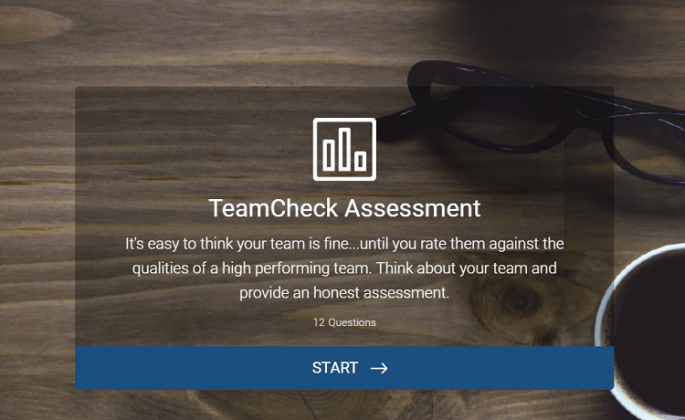
Think about the best teams you’ve ever been part of or had the pleasure of watching do their thing.
Now remember a teamwork disaster that you’ve experienced. Hopefully the painful memories aren’t too difficult to bear.
These two memories represent the end points of a teamwork effectiveness continuum, at least based on your personal experiences. There are likely better and worse examples than what you have, but to keep it real, these will serve our purpose.
How do you know?
With that full range of effectiveness possibilities in mind, I want you to think about the team you lead or of which you are a member. Where does this team fall on the continuum?
It’s a hard question to answer when you try to make an overall assessment. There are too many factors to consider, and it’s easier to rate them one at a time.
If you want your team to start improving its performance, you need to establish its current performance and then set a goal for where you want it to be.
The 20 characteristics
You could go back to the good and bad teams you are thinking about and try to identify those characteristics you unconsciously considered when evaluating them, or you can use the list I’ve assembled for you.
Here are the characteristics you will be asking your team members to rate. For each, I’ve included a brief explanation of why it’s important.
1. We have a clear sense of purpose
This unifies the group. Everyone knows why the group exists. In addition to being clear, it should also be important. Cool is better yet.
2. We have measurable objectives
Goals are the fuel which drive each member’s effort. They know there is work to do, and they strive to get it done.
3. Our purpose supports the larger organization’s purpose
Each team represents the use of scarce resources. People are expensive. They should only be deployed doing something that helps advance the larger organization.
4. We know how the team will be evaluated
People want to win. The trouble with many teams is that winning hasn’t been defined. If you don’t know what good looks like, how do you know you’ve achieved it?
5. We understand our customers’ expectations
Each team serves others. These could be internal or external customers. To succeed in this task requires that the team knows what those customers expect.
6. Groups and individuals that support us understand our expectations
In most organizations, a team’s success depends on the support they get from others. To be well-supported, those people need to know how best to provide that support.
7. We agree on the process for completing our work
There are many ways to get the work done. Efficiency usually requires a shared process. When this characteristic is missing, chaos reigns.
8. We each do our “fair share” of the work
This has to happen to prevent the all-too-common fight that begins when team members begin to think I’m working way harder than her.
9. We have access to the resources we need
This could be experts, data, tools, equipment, or decision authority.
10. We effectively make decisions
Teamwork requires decisions. Lots of decisions. Getting good at making those decisions quickly separates strong teams from weak teams.
11. We communicate openly on the team
Almost all teamwork problems can be traced back to a team’s inability to effectively communicate. Assertiveness and candor are necessary teamwork ingredients.
12. We communicate openly with interested parties outside of the team
Your team might be doing good work, but if nobody else knows it, you have a problem.
13. We effectively resolve conflicts
All teams have conflicts, which in themselves are not problems. They only become a problem when they go unresolved or people are bloodied in the process of resolving them.
14. We quickly address problems that are hurting the team
When the inevitable problems arise, good teams notice, raise the concern, and go into problem-solving mode. They certainly don’t struggle with an “elephant in the room.”
15. We each understand what is expected of us
A team is a collection of individuals. Each person has to know what he is supposed to do to be an effective team member.
16. We support one another
A bunch of individuals all doing their own thing in isolation from coworkers is not a team. Effective teams are collaborative and supportive entities.
17. We continuously monitor our performance
Doing this assessment is an example of monitoring performance. You can’t fix what you don’t notice. Ask the questions.
18. We work at continuously improving our performance
Effective teams recognize there are many improvement opportunities. They are all about growing better together.
19. Our team achieves (will achieve) its goals and objectives
The bottom-line is always the results. Working well together means very little if the team can’t deliver.
20. We each feel good about being a part of this team
Results without connection to teammates doesn’t work either. At the end of the day, people are glad they are a member of this team.
Take the TeamCheck Assessment now
Here’s an online version you can try now for yourself. It uses some, but not all the 20 characteristics of effective teams. It will likely take less than 5 minutes to complete.

If it seems that few of these characteristics describe your team, it’s time to take action. With the right help and the willingness to make a change, your team can do amazing things.
When teams are struggling, members may hesitate to complete the assessment honestly.
In those cases, you’ll need to take another approach. I can administer the survey for you so that people can respond anonymously. I can also conduct individual interviews to understand what is and isn’t working for your group.
To discuss how I can help you conduct a candid assessment, reach out, and we’ll talk through your situation.

